The Other Georgia, Part II – Stepantsminda
March 10, 2016
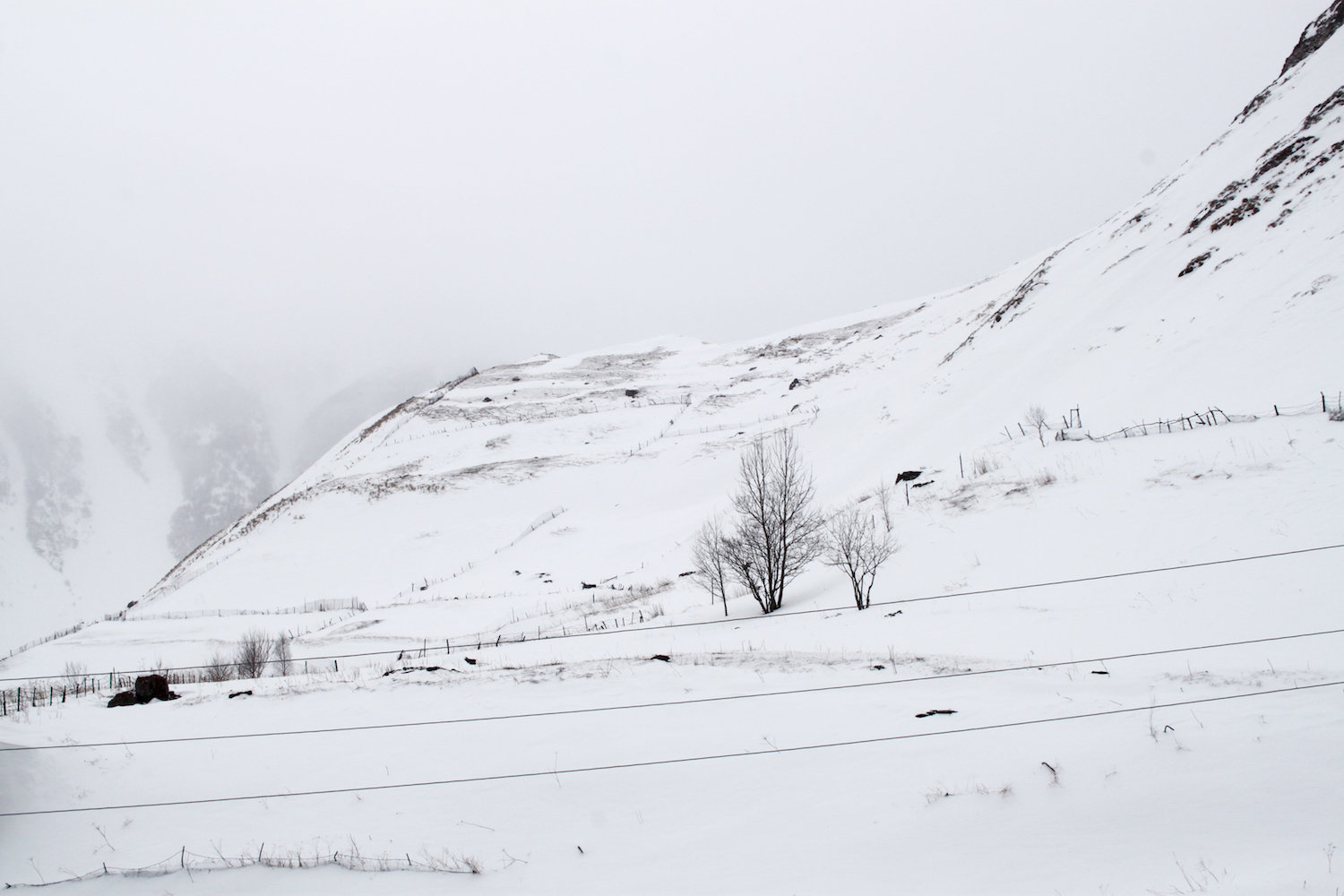
The morning dawned weakly and dull the day we embarked for Stepantsminda – a village lying at the base of Mount Kazbek, the seventh-highest peak in the Caucuses. The riders in the subway were half asleep, and we ourselves only jerked awake outside the Didube station to the shouts of vendors hawking small lemons and nuts, hot khachapuri and coffee. Marshrutka drivers were looking for passengers to fill their vans. They shouted out destinations – Kakheti, Gori, Mtskheta – places we had seen the day before and places we had not.
A driver hustled our direction and asked where we were going. “Stepantsminda,” we replied, and he gestured toward his weathered red van. That was just the route he was taking, he said. “Are the roads safe?” I asked. It had been unseasonably warm in Tbilisi, but this was February after all, and there was no telling what conditions were like at higher altitudes. “I am from there,” he said. And while I couldn’t have known it at the time, I later found out that what he meant by this was, “No, but I’m used to it.”
We bought a quick breakfast from a nearby stand – crescent-shaped khachapuri stuffed with hard-boiled egg – and ate it as the van hobbled along the highway out of Tbilisi. We were tired and fell asleep, but soon woke to the jolt of the road, littered with potholes and dirty slush.
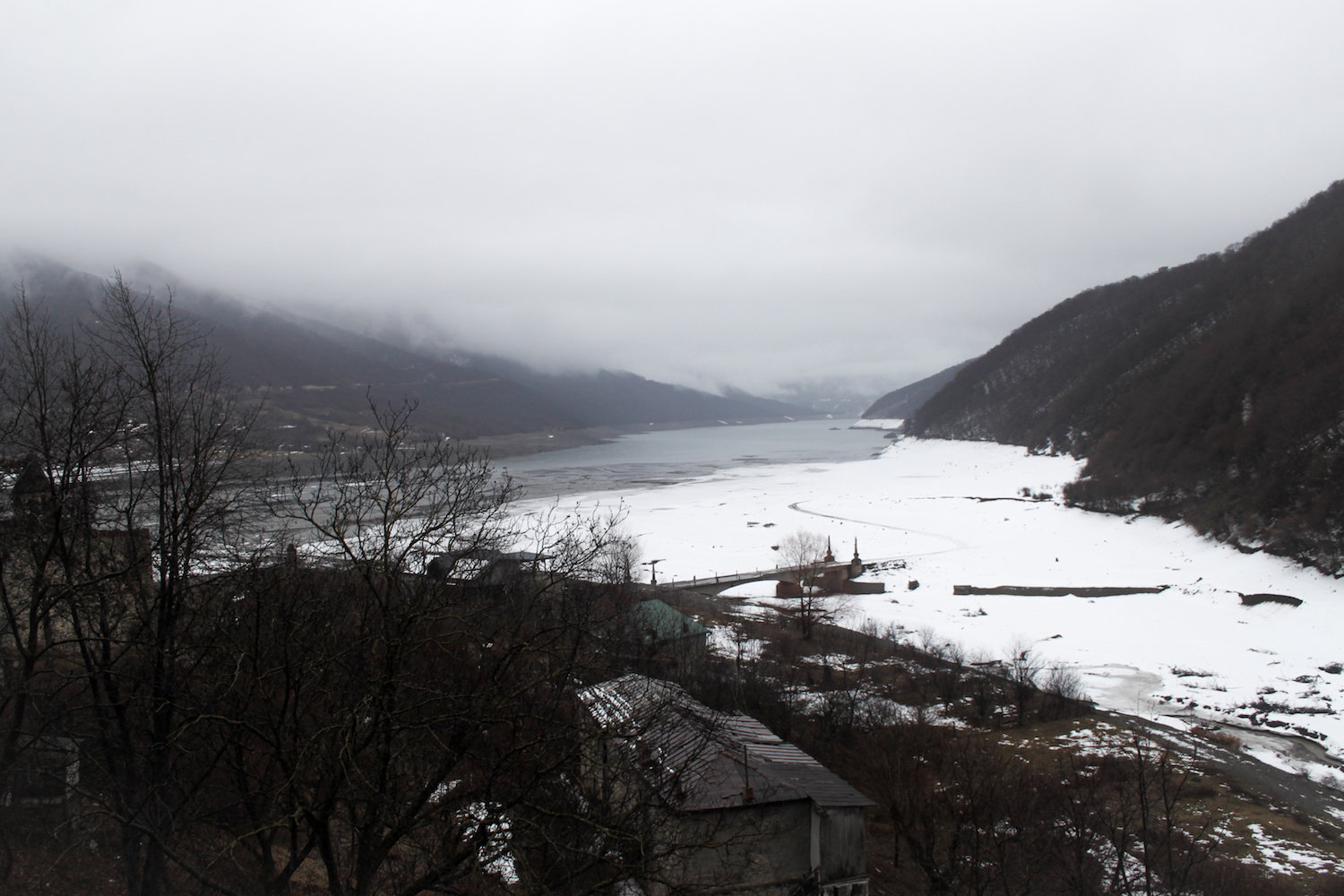

At a monastery, we scrambled out to take pictures. Snow patched the ground, and wet drizzle chilled my bare hands. Below us, the river sluggishly plowed along the banks, freezing in the shallows. The road continued to climb, and the next time we stopped, there were old women wrapped in headscarves and wool selling fruit leather and churchkhela hanging in long, burgundy rows. One woman tried to sell me bright woolen socks. “Fifteen lari,” she said, shoving pair after pair into my hands. “It’s too much,” I replied, picking up my bag of sweets and walking back to the van.
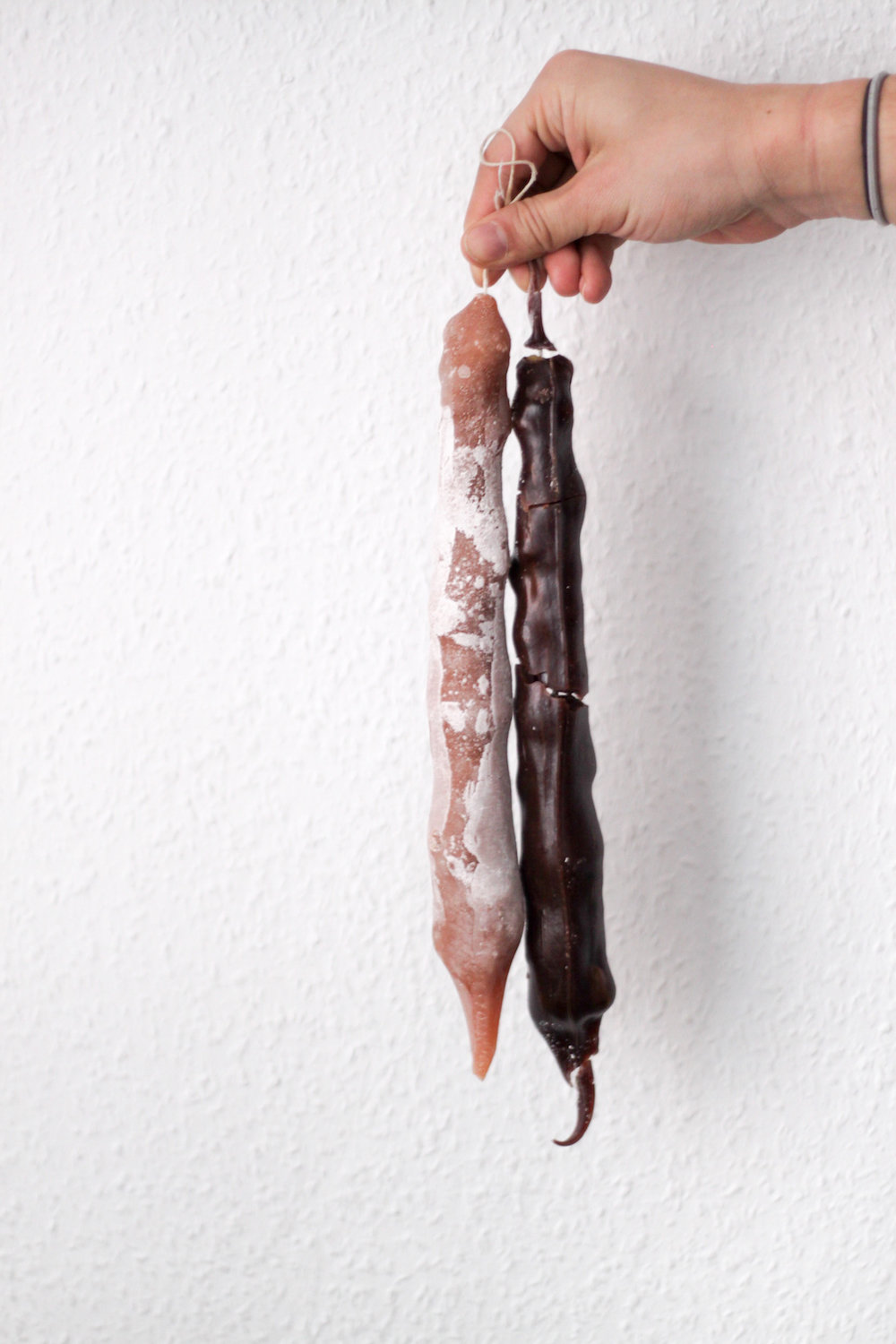
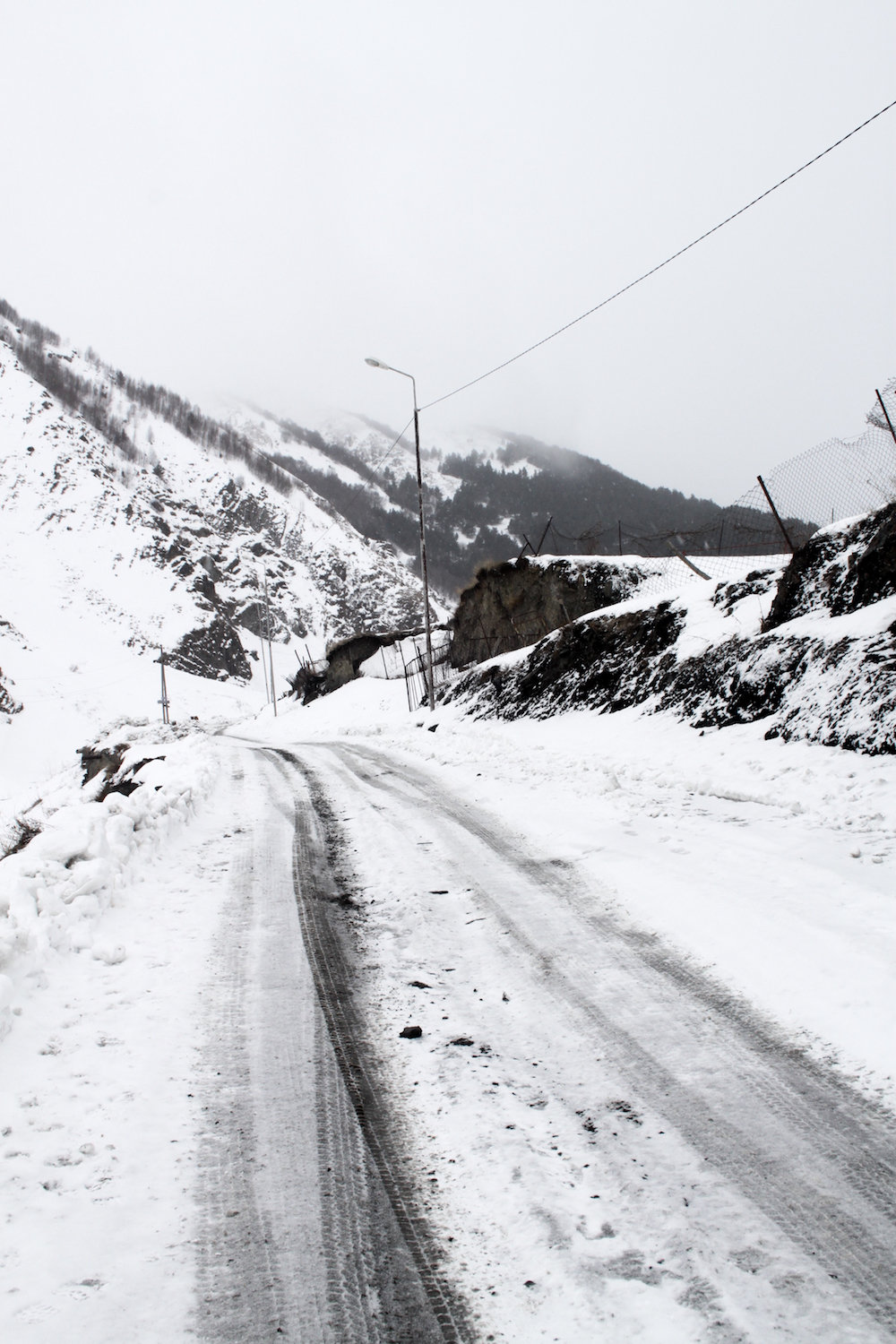
As the road rose, the vista opened up – dark rock shaggy with snow, deep green pine, and sleepy, shuttered hamlets huddled in the valleys. The sun was shining brightly in Gudauri, the last town before Stepantsminda, and the little houses dazzled in the white.
We wound up and past them, and in just a few bends, the wind picked up and started slashing crystals of snow across the road in gusts. A van ahead of us blew a tire and cars stalled, trying to navigate the icy pass. Our driver took advantage of the lull, jumped out, and wrapped the tires in chains. A policeman shouted out his truck’s window on a megaphone in angry Georgian as the snow ripped out of the low, grey clouds. I think he said, “Turn around, you stupid fools.” But we were too far from Gudauri to walk back down without the van, and there was nowhere on the road to turn around.
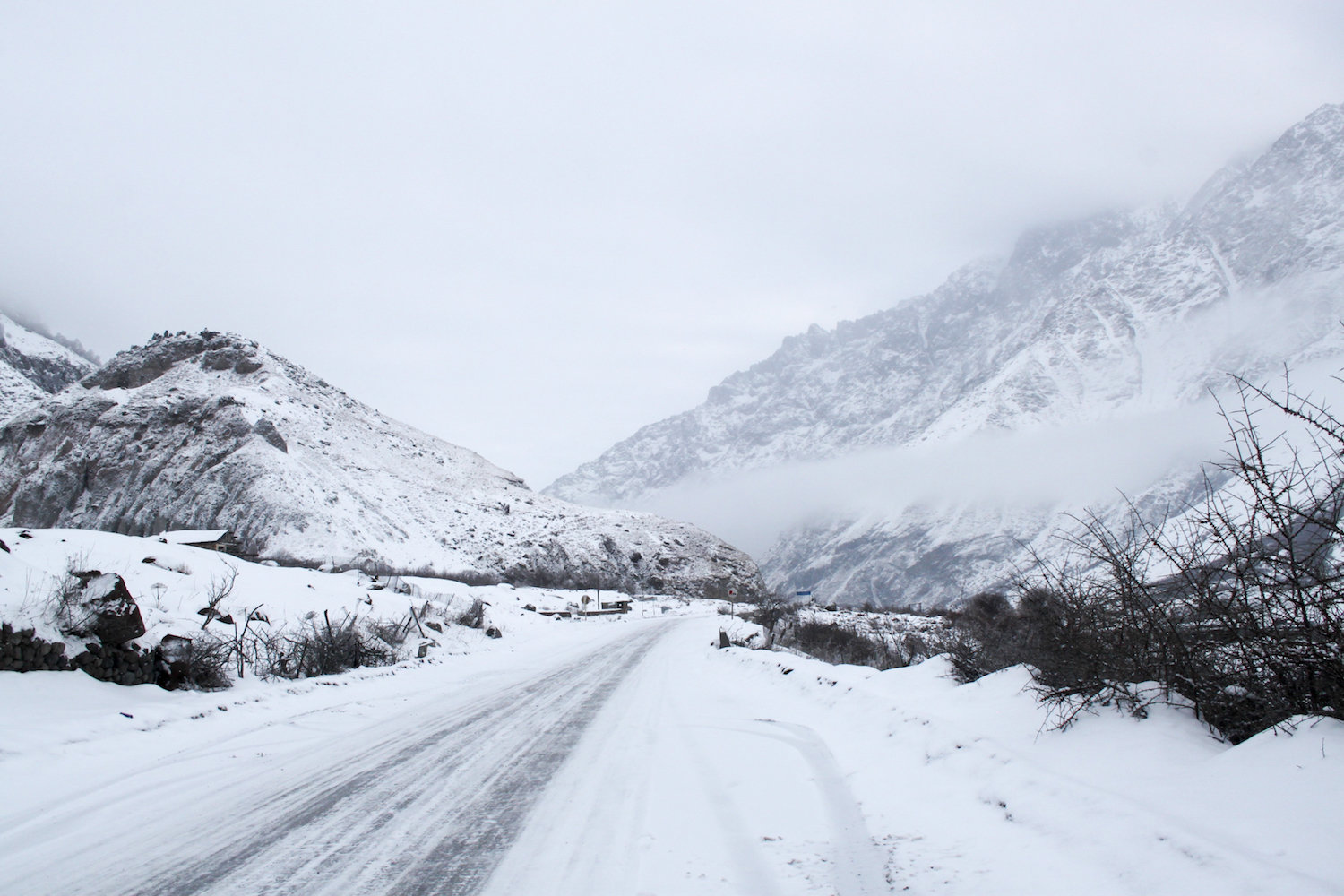
Mostly, what road there was, was gone, lost in swirling sheets of white. The van’s chain-wrapped tires slowly clunked over the packed snow and ice. A snowbank loomed to the left, and abandoned buildings materialized from the whirl. We were quiet in the van, intense. The other couple heading up to Stepantsminda was from Brazil, but he had lived in Russia for a time, not far from where we were. He told us not to worry, that these people knew what they were doing. Once, he’d been on a plane whose door wouldn’t close. He said the co-pilot came out of the cockpit – cigarette dangling from his mouth, his arms covered with Russian air force tattoos – and pounded the door shut with a hammer.
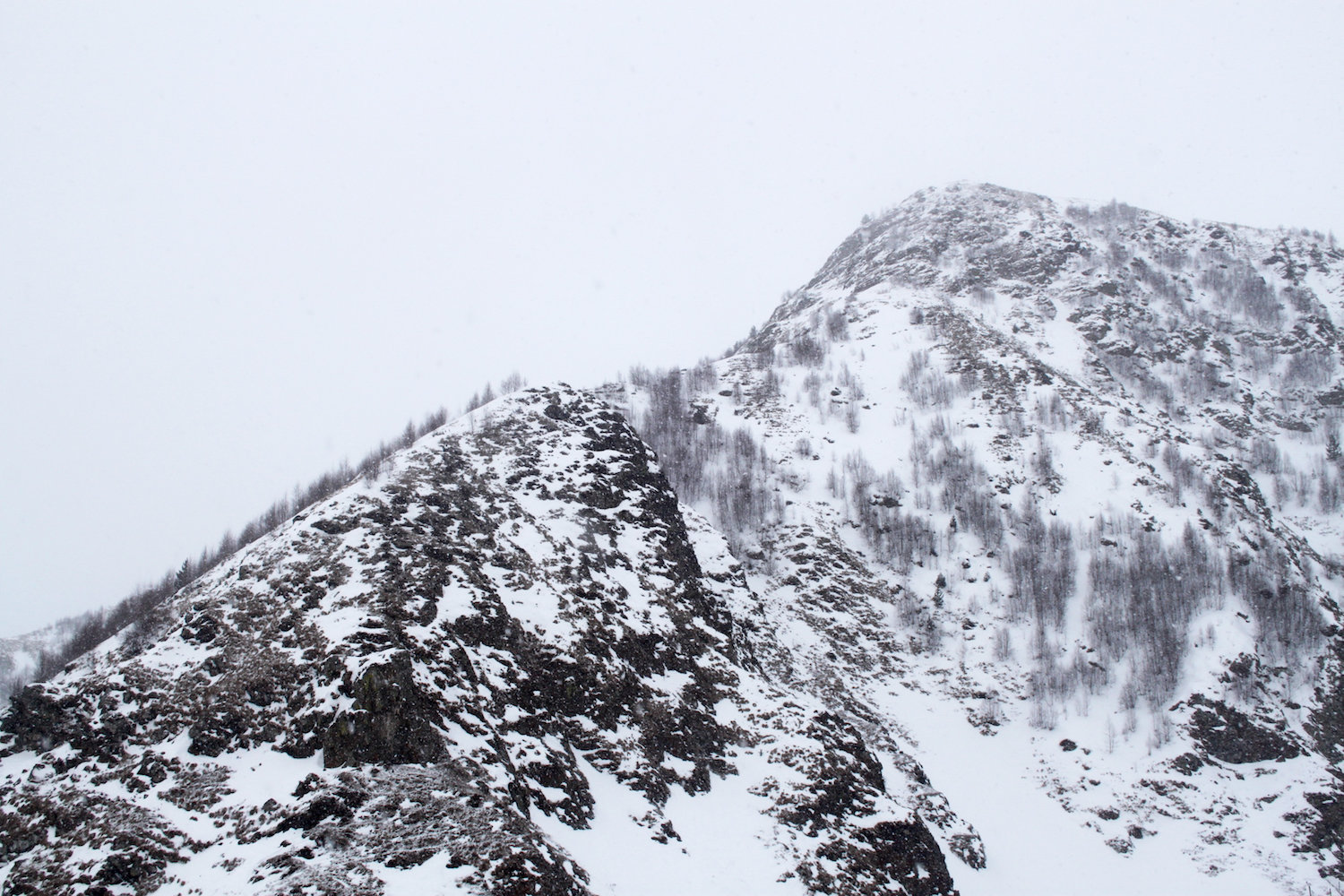
He was tracking our progress on his phone’s GPS. “Soon, we’ll start going down again. Then it will get better.” And sure enough, the road slowly began to slope, and we drove through tunnels that kept the snow from falling in our way. The weather cleared as quickly as it had begun, and Stepantsminda came into view – a tiny, snow-covered town. I nearly kissed the trampled slush beneath my feet.
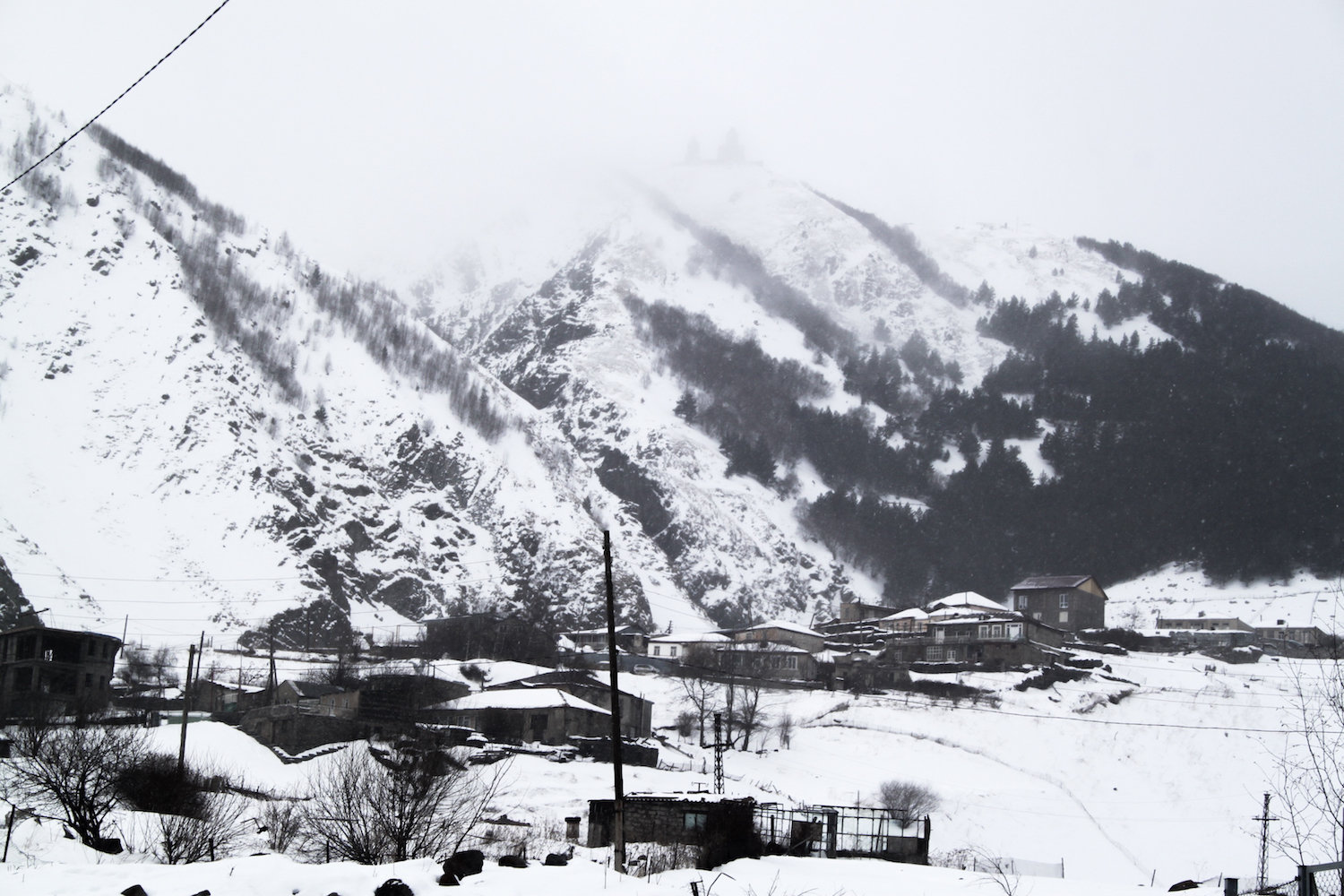
Only one restaurant appeared to be open, and we went inside to warm up. At the end of our harrowing ride, we were rewarded with dark Turkish coffee, thick as an oil slick. The manager was a strange, small man. He paraded back and forth across the worn, wooden floor, hands tucked inside the pockets of a fancy jacket, a beginner’s paunch taking shape beneath his black cashmere turtleneck. The restaurant’s tables and benches were low, the furniture rustic – everything, even the walls, made of highly-polished wood. The manager, the little king of Stepantsminda, stuck out like a desert rose.
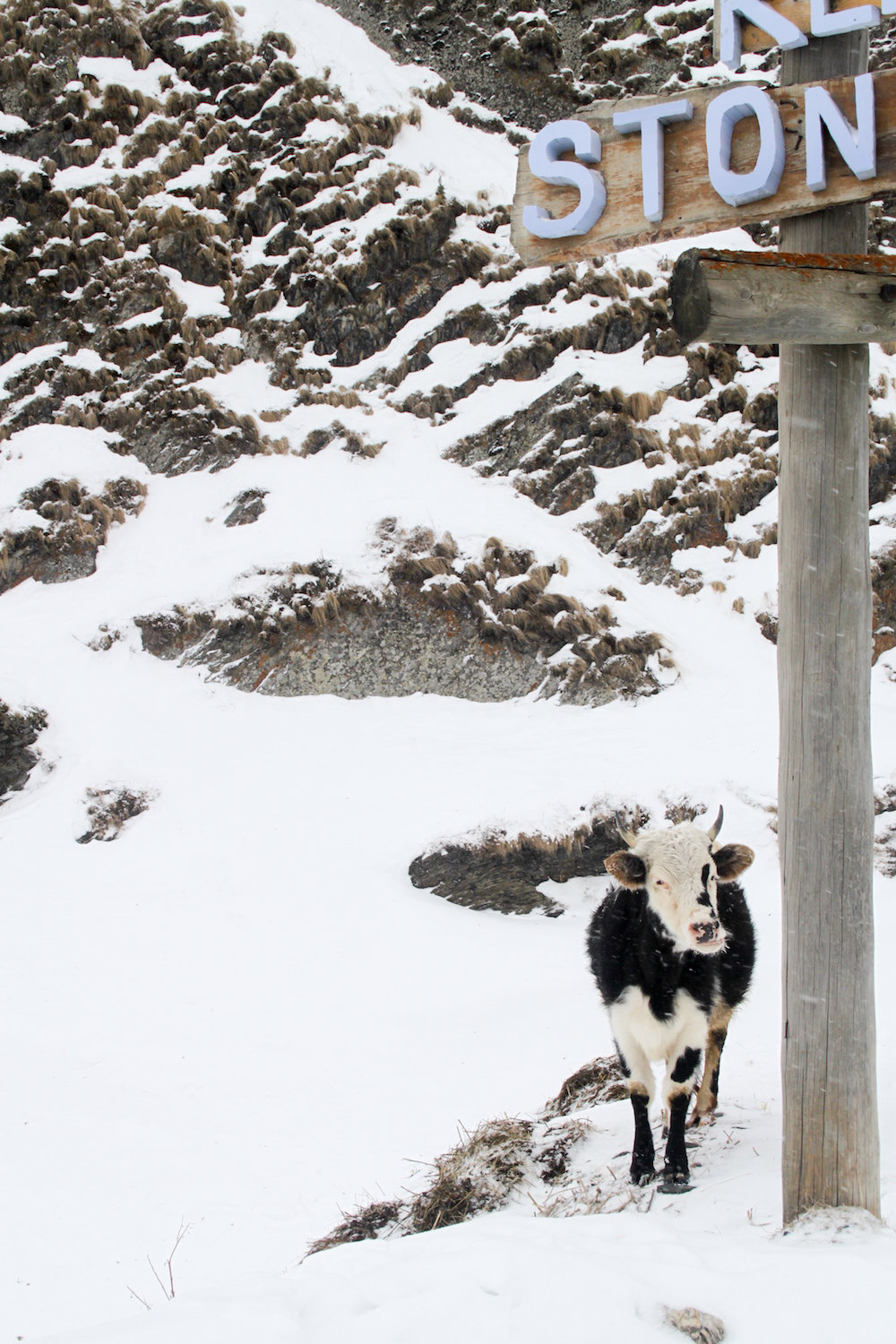
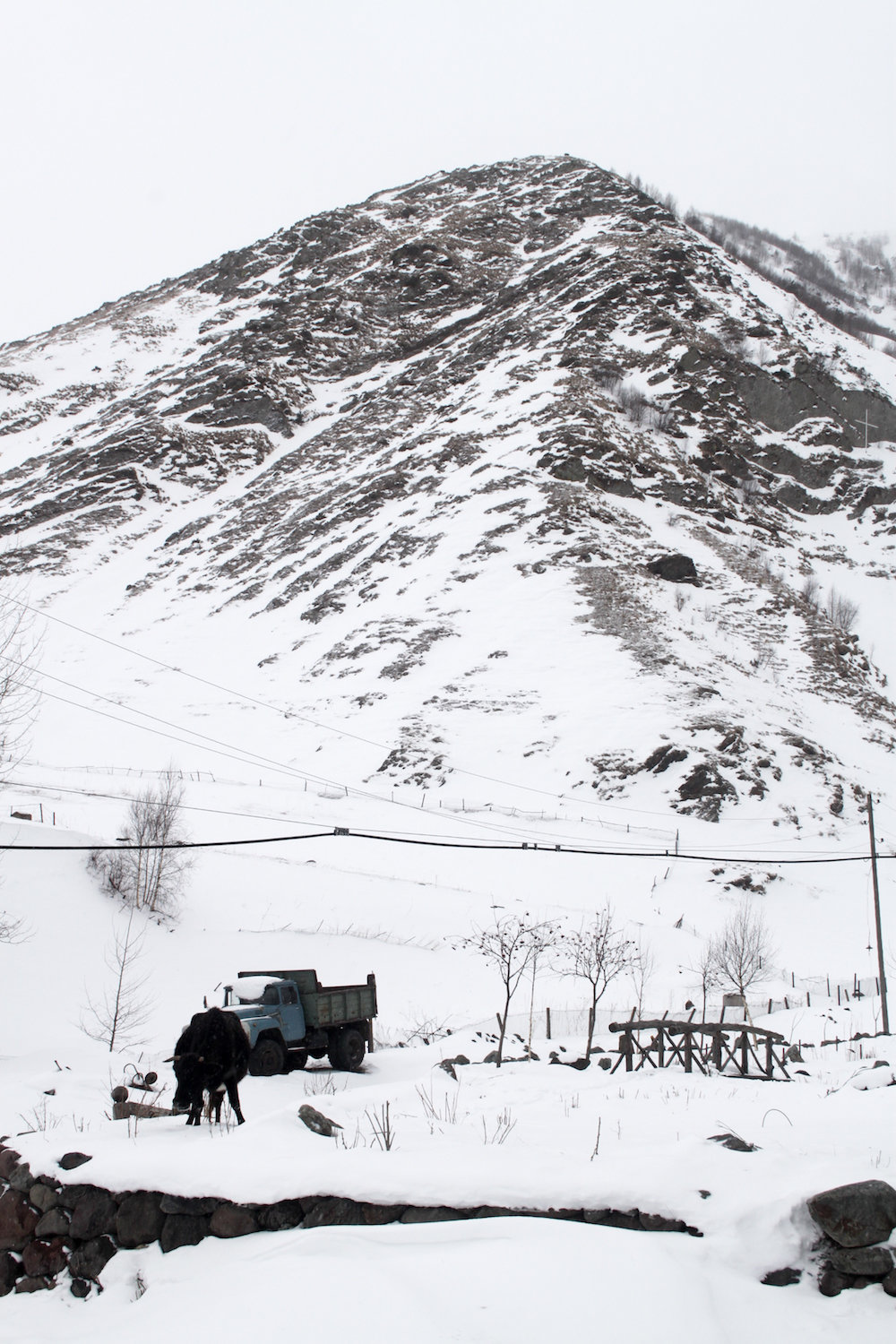
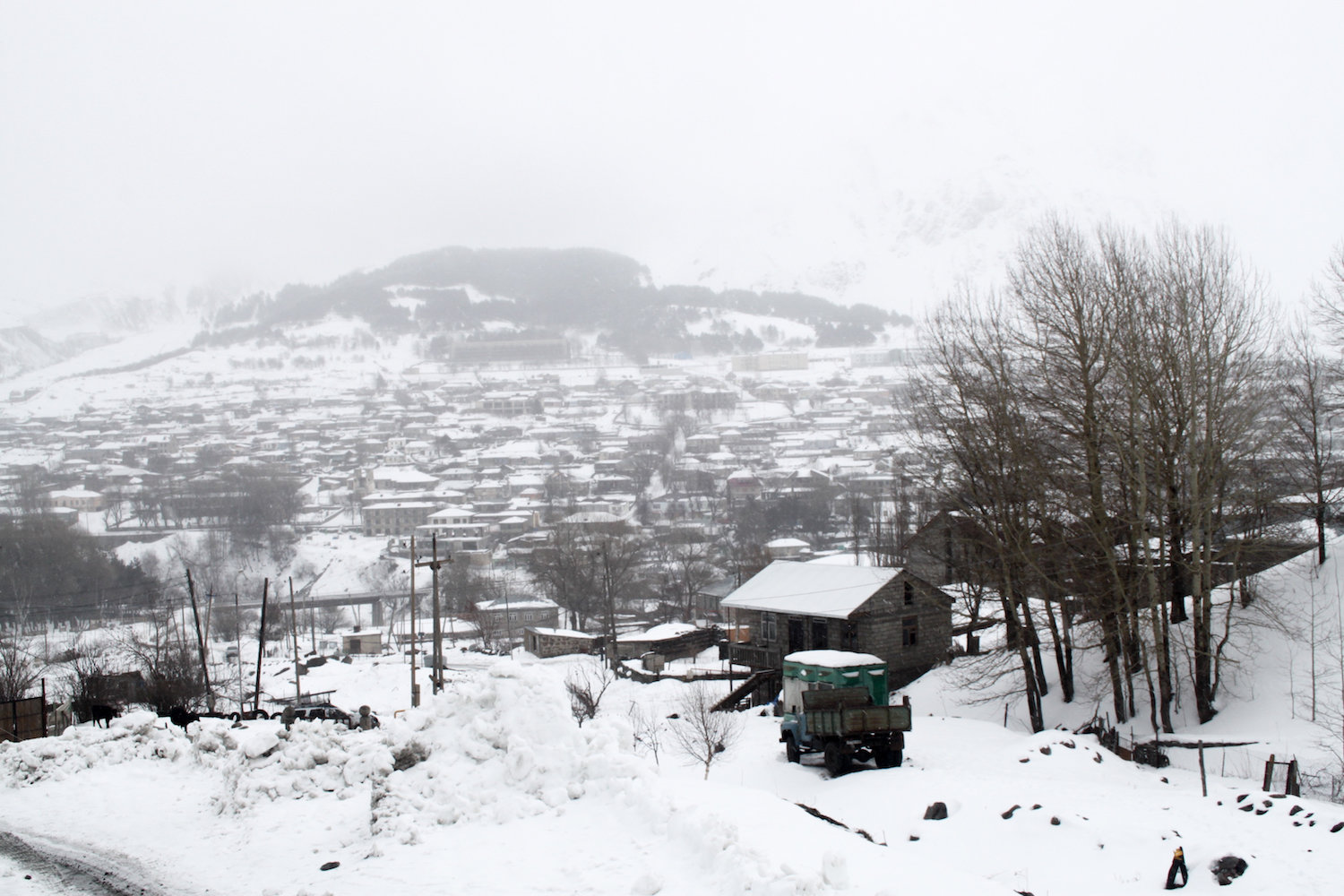
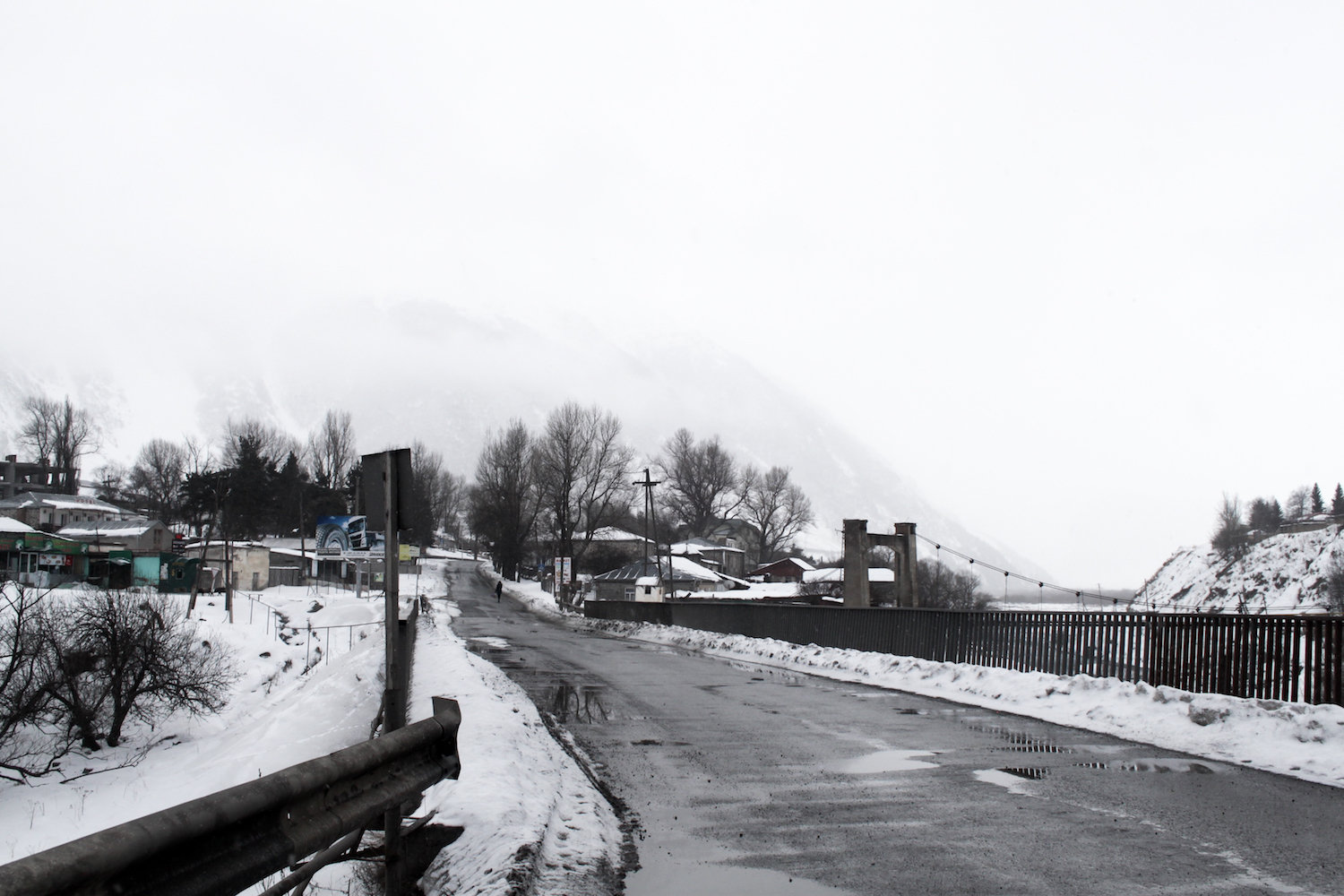
When we left, it was snowing gently, but the light was good, so we took the path leading up to the Gergeti Trinity Church. A small black dog scampered up to us. He didn’t beg for food or affection, seemed just to want the favor of our company. He pranced ahead, as if he knew our route before we did, as if he were some kind of animal spirit guide.
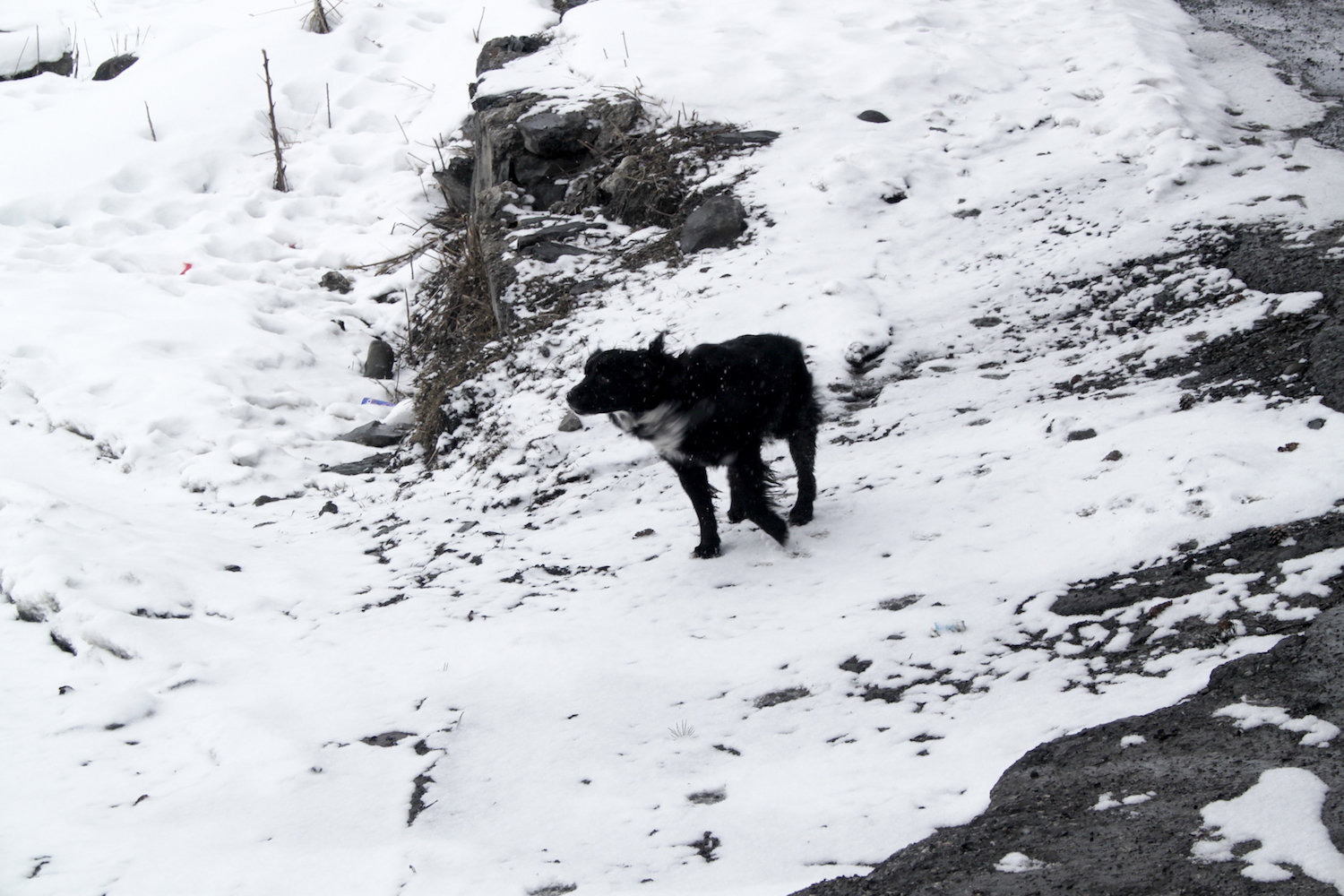
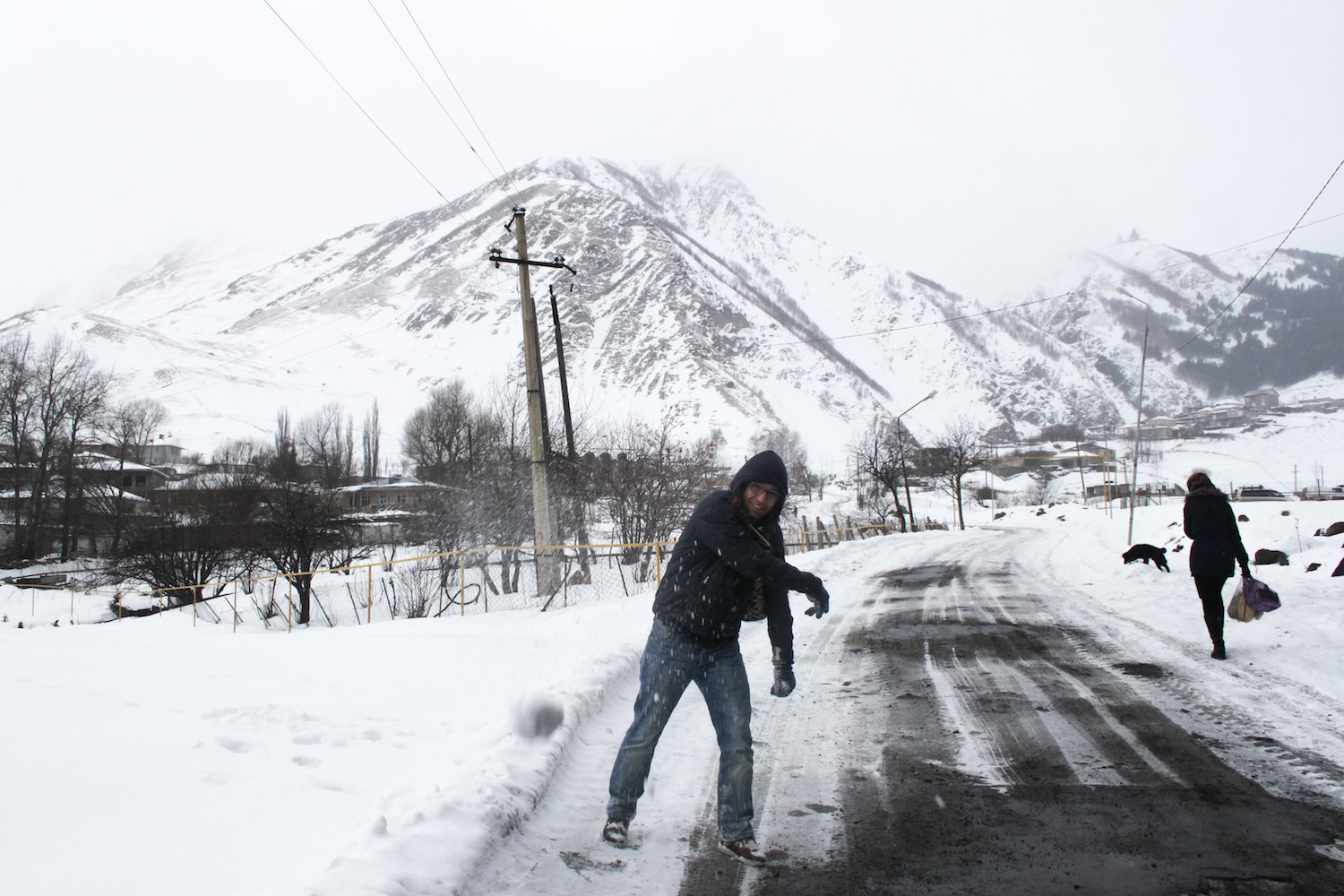
There were few people out, a woman carrying bread up the path, a man chasing a shaggy brown cow down, the cow deaf to his shouts. The cows were everywhere, stripping dry stalks of grass from beneath the snow. Ruins sprouted up, stone foundations and partial walls abutting small houses. It was hard to tell whether they were in the process of being built up or crumbling down. When the sprightly black dog turned around to go back down the trail, he was soon replaced by another – giant and yellow with gentle golden eyes the color of pooled honey. He’d leap ahead, then bound back to nudge our chilled hands.
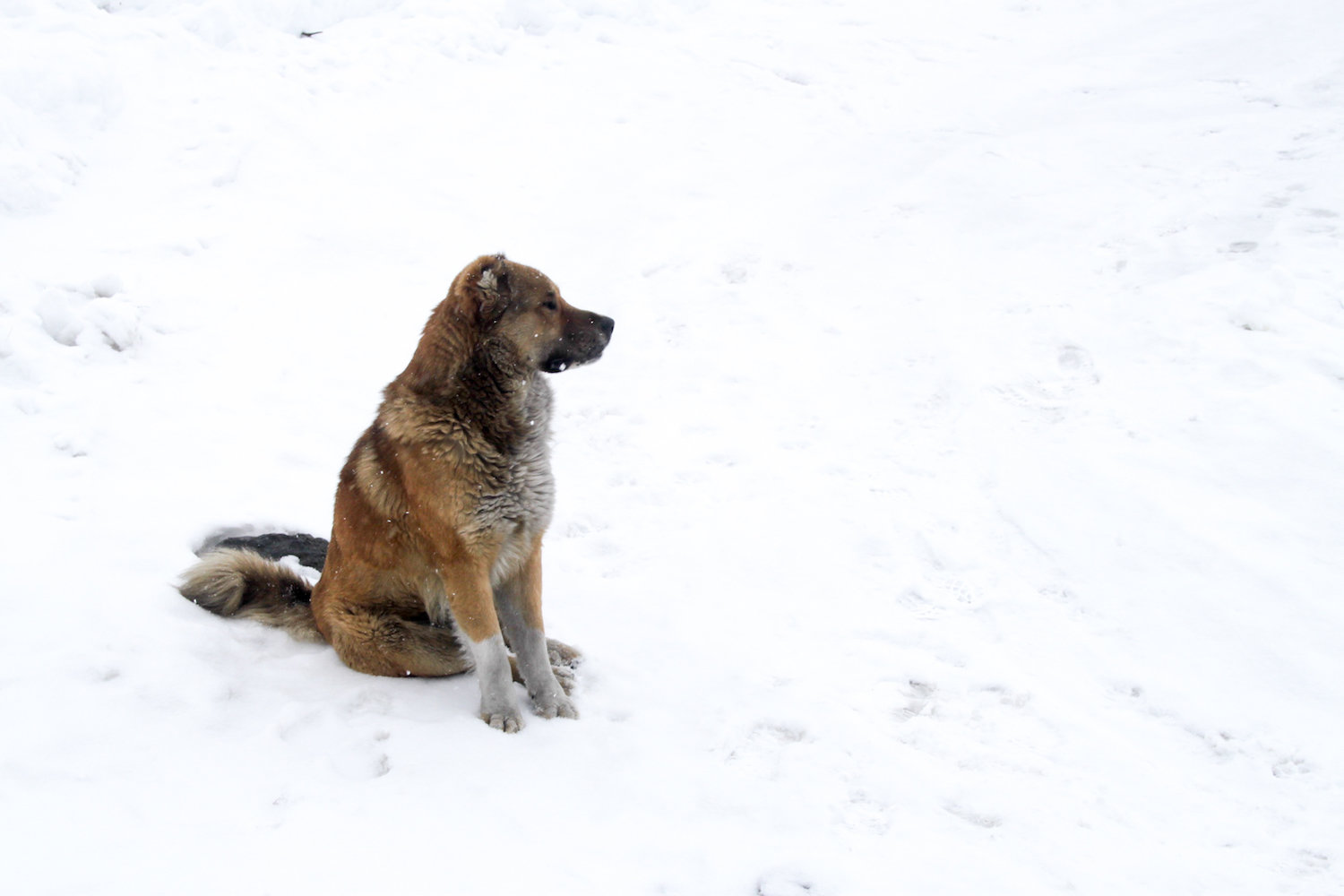
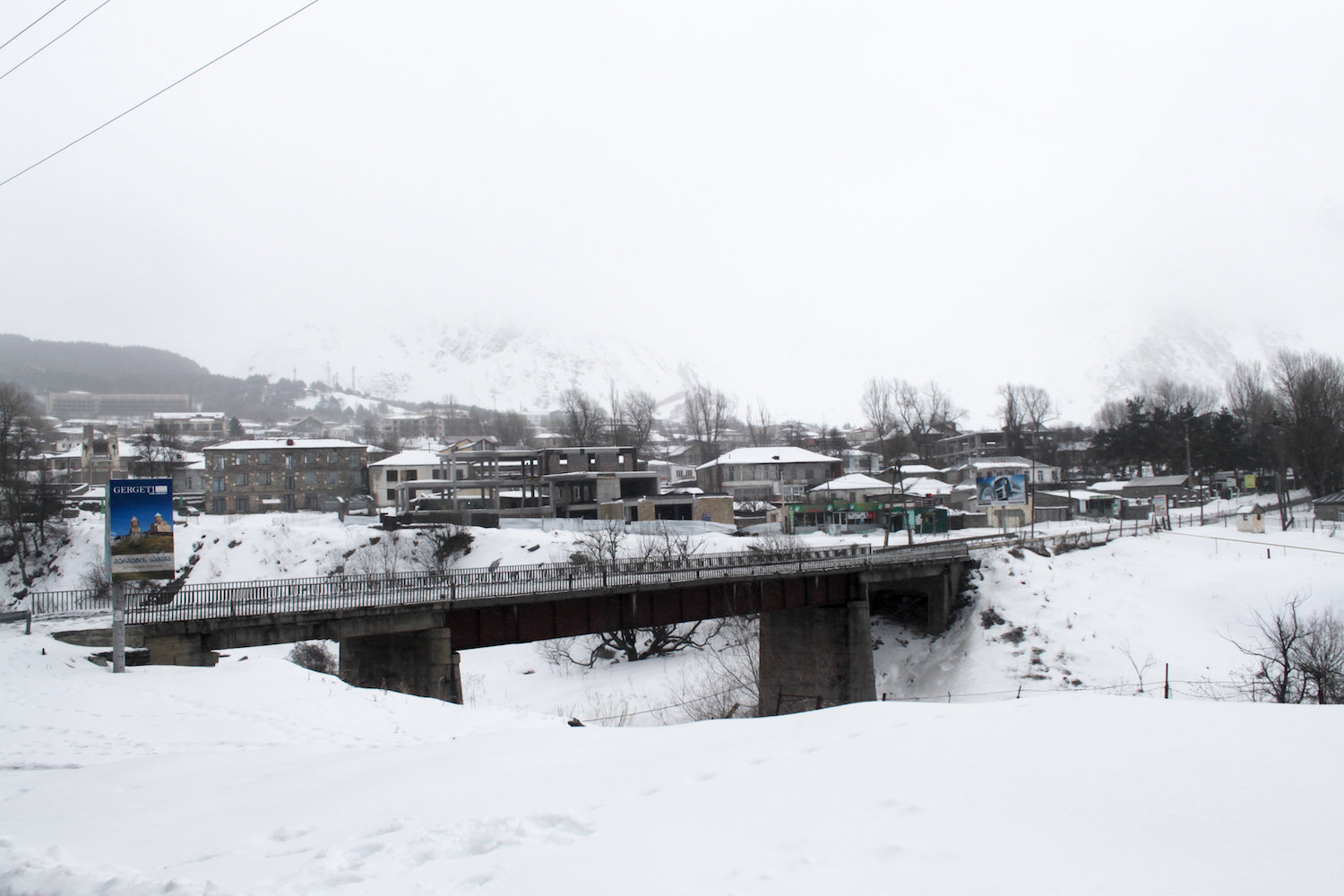
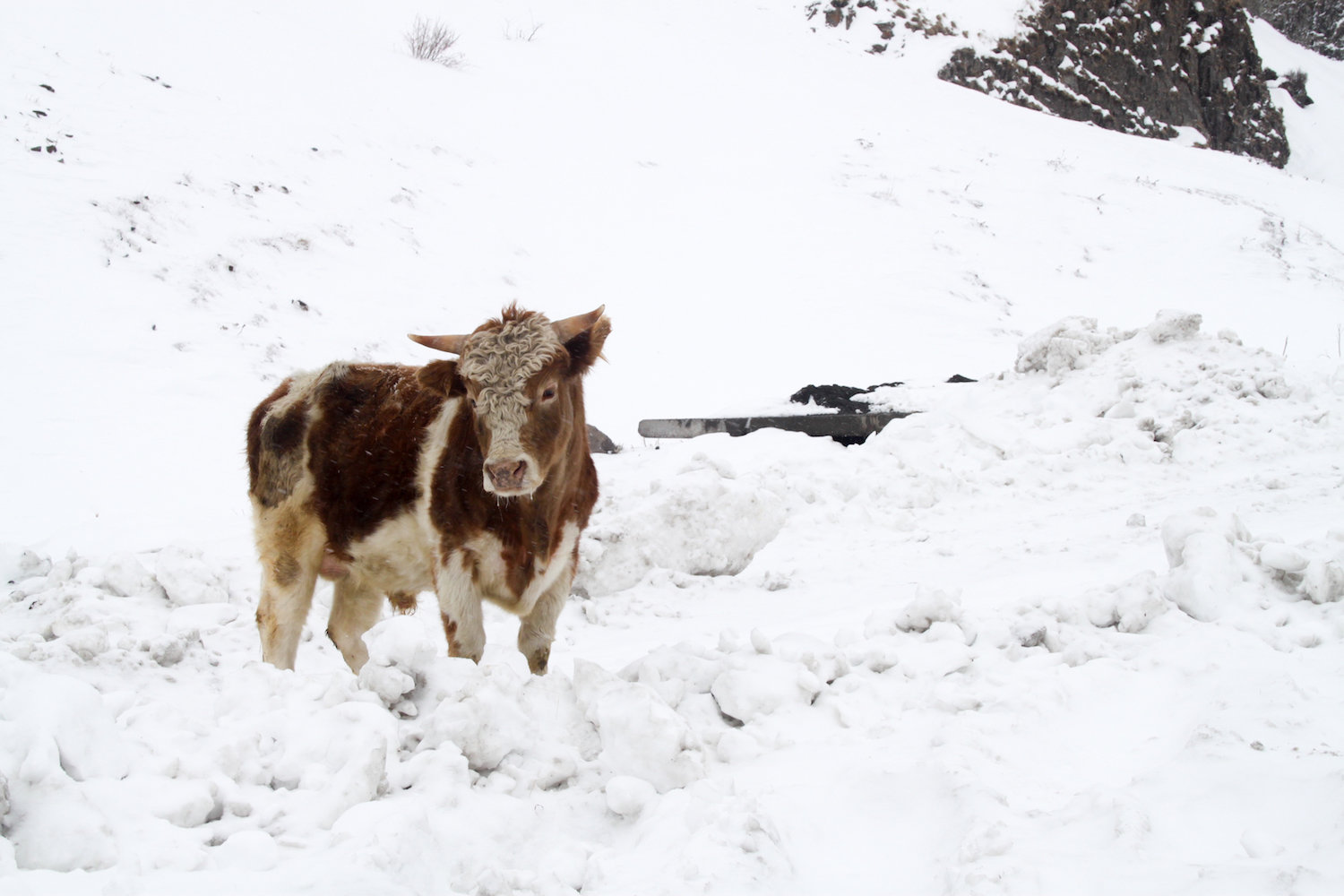
The path ended abruptly at a gate, and since we were both beginning to go numb, we turned around and went back down the way we’d come. When we met the driver, he told us the road was now closed. The snow had picked up in intensity, and the sky was grayer, more full of mist. His friend had a guest house, he said. We could stay the night with him.
We went back to the sole restaurant and sat down to a late lunch. The manager handed us menus – long and exhaustive. I was looking forward to trying lamb with stewed plums and tarragon, and David had picked out grilled pork. But when we ordered our food, he shrugged. “Ah, that is not in season. I have beef.” He pointed to a stew on the menu. “I would recommend this for you. And for you, the kebab.” “How big are the khinkali?” I asked. “You will be too full to eat them,” he said, and walked away.
But the food he brought from the kitchen was good. The stew was hot and flavorful, silkily tender beef simmered for hours with tomatoes and herbs. We spooned it out of the clay pot onto hunks of salty, fresh-baked bread. The kebab was sprinkled with sumac and parsley and wrapped in thin lavash bread. We dipped it in tkemali, tart sauce made from stewed plums.

We finished lunch, washing it down with sparkling pear soda and sopping up the last of the stew. “Your khinkali are coming,” the King of Stepantsminda said, and we were both surprised. First, because he’d told us we’d be too full to eat them. And second, because we were too full to eat them. I’d only wanted one, had been looking forward to the hot broth warming my belly after our cold walk. But he brought out a plate of ten steaming khinkali, their twisted knots pointing to the sky. We each had one and packed up the rest.
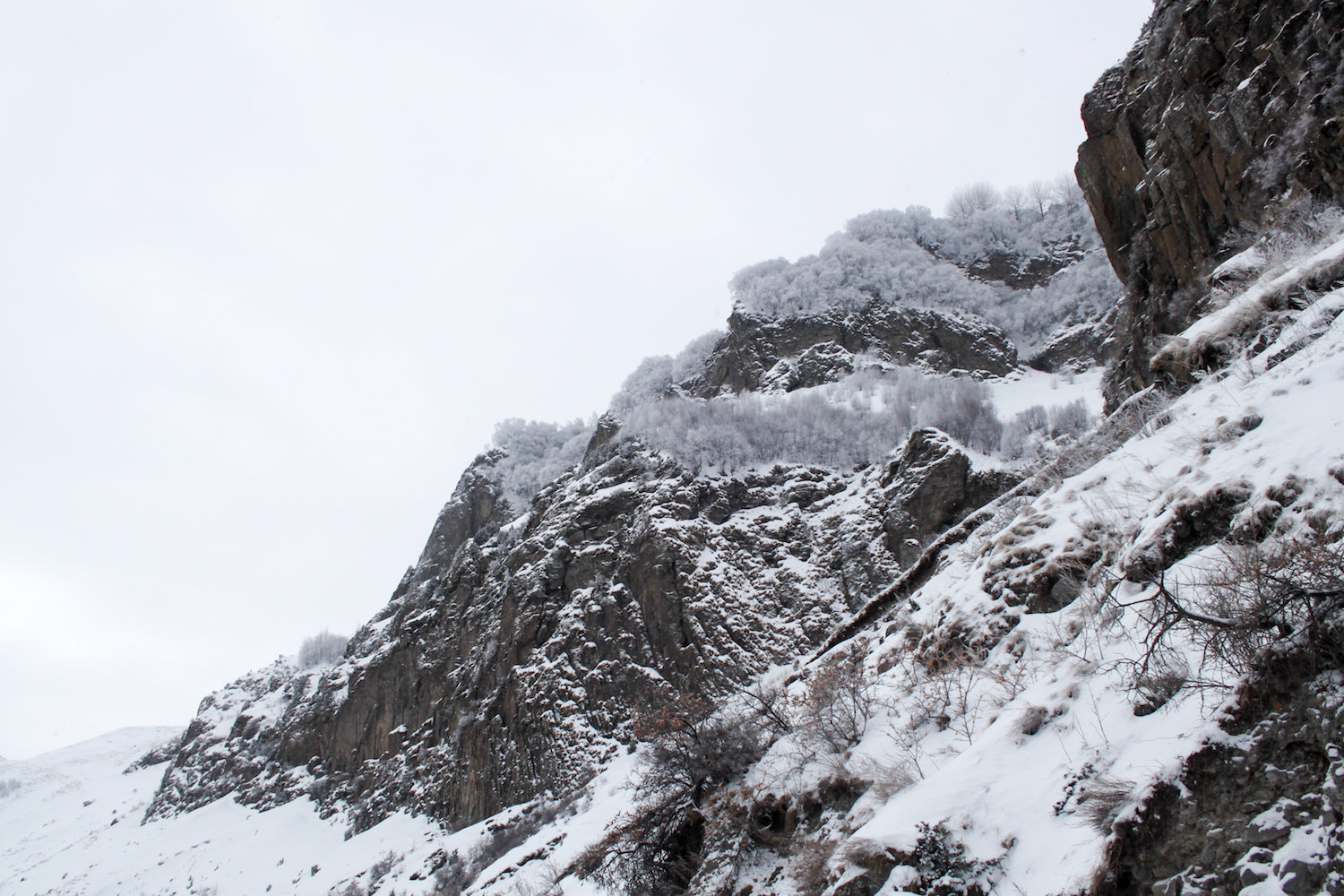
The guest house was a small room lined with three saggy beds and a gas heater weakly purring in the corner. We peeled off our wet socks and boots and laid them out to dry, then lay ourselves down for a nap. I fell asleep with ice cold feet, wishing more than anything that I had bought those 15-lari socks.
It was dark when we woke, a glittery moon casting eerie shadows on the snow. Outside, our yellow spirit dog was waiting. He gave a friendly wag and jumped up to guide the way. We walked through the deserted town, cool blue under the lights, a soft, wet snow shuddering overhead. We were joined by our black spirit dog, and the two dogs accompanied us through the streets. But our spirit dogs didn’t seem to like each other all that much, and snarled now and again out of protectiveness.
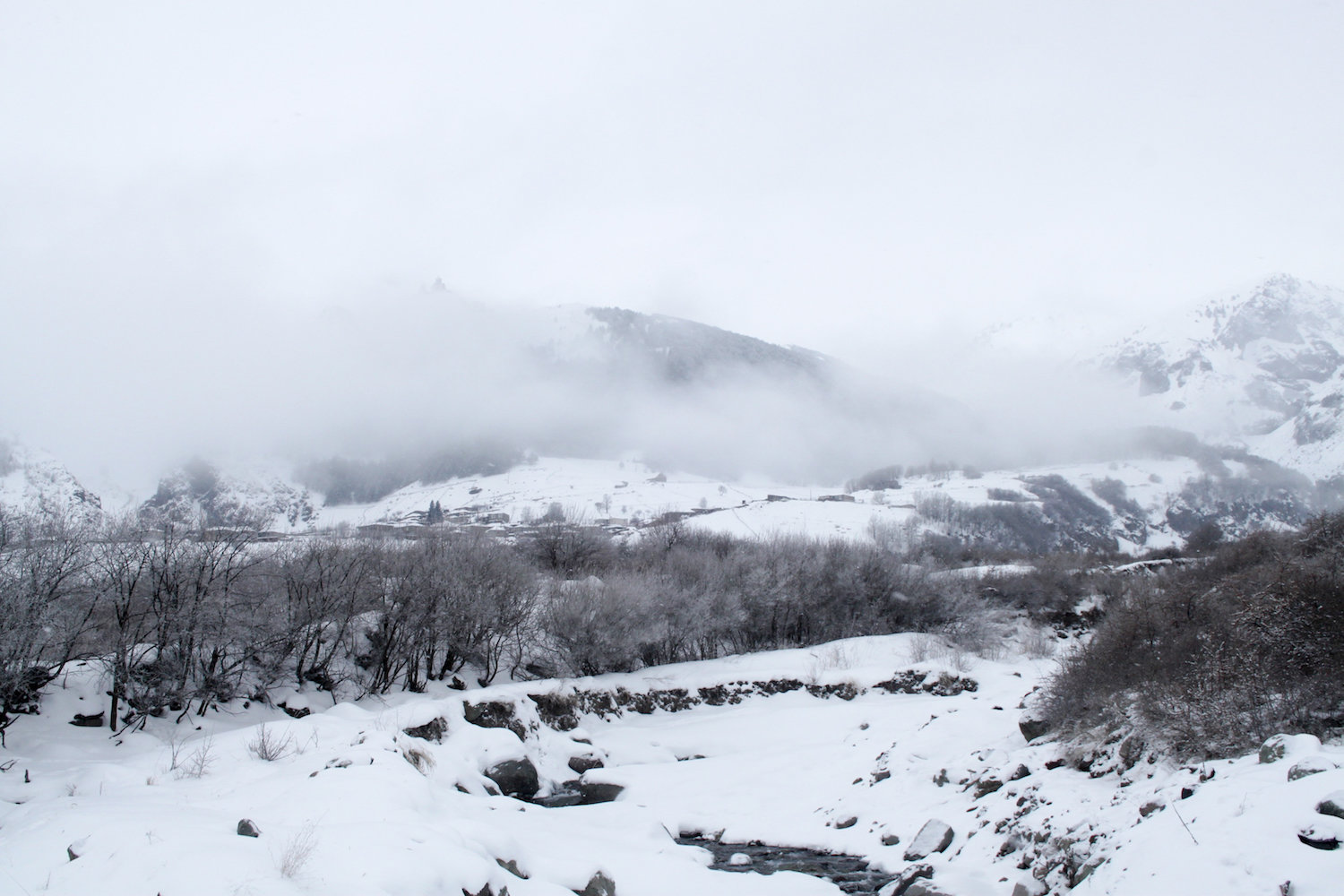

Though it wasn’t late, the darkness felt solid, and the day had been long. We shuffled back to the guesthouse and set the chairs up by the gas heater, as welcome to our icy bones as any roaring fire. We made a small feast of cold khinkali and Roland’s homebrewed wine. For dessert, we stripped nuts from the churchkhela and ripped off thin, sour slices of fruit leather. We hadn’t expected to stay the night, had no toothbrush, no extra clothes, no books to read, no computer. But the low, steady hiss of the heater’s flame was like a lullaby, our thoughts entertainment enough.
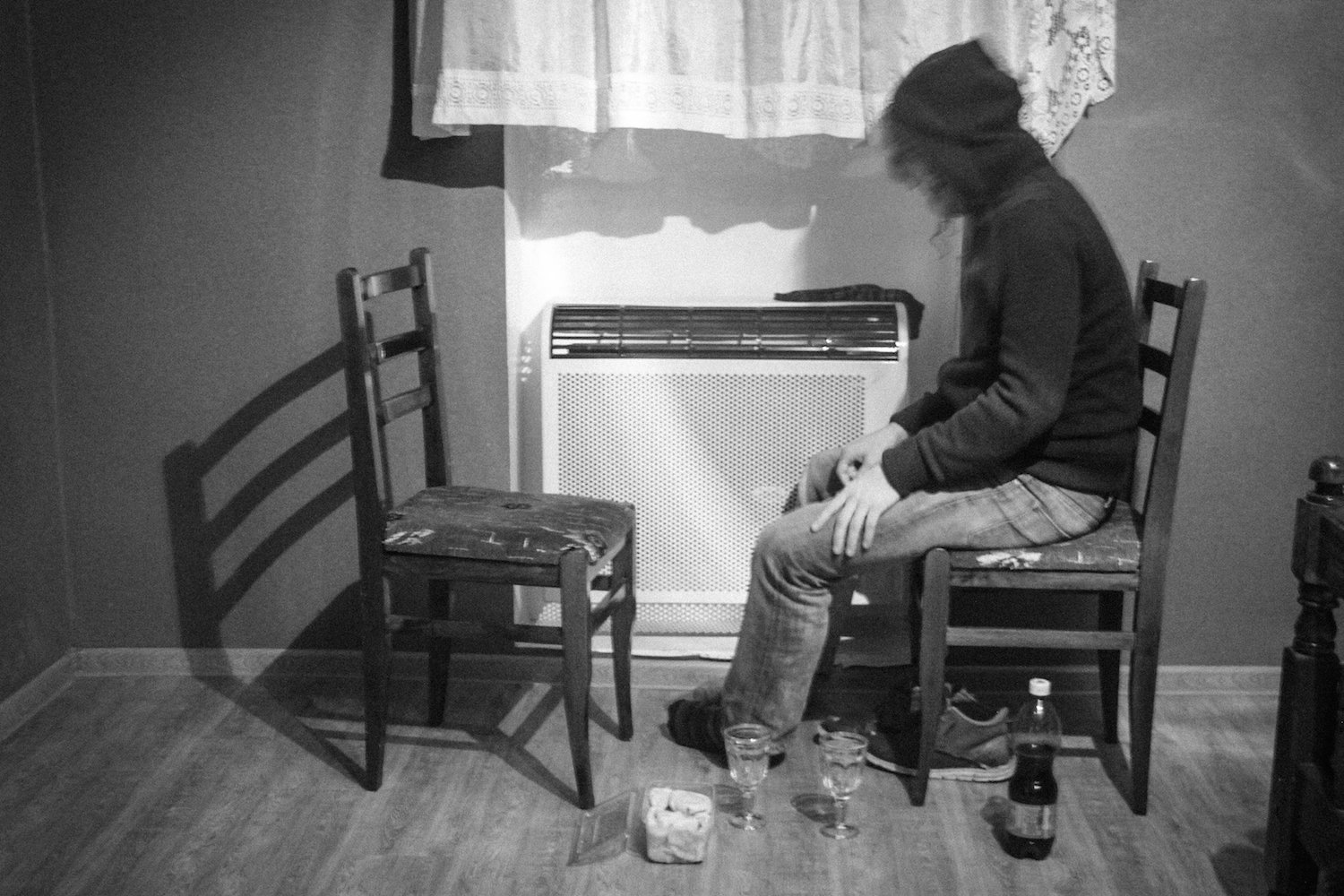

We woke early to a knock on the door – our host had made breakfast. He brought in a plate of something like poffertjes – sweet, buttery dough with sugar-crisped edges and a dollop of sweet red jam – and hot Turkish coffee. We asked about the roads. Still closed, he told us. But maybe in an hour.

We trekked outdoors again, this time taking the road north, out of Stepantsminda. It was empty and cold, the only sound the Terek River scampering across boulders and sucking up melting ice. As we walked, the mist clinging to the mountains began to lift, revealing cracked and jagged teeth slippery with powder. Suddenly, there was sunshine glaring off the white snow. Surely, now, the road would be open.
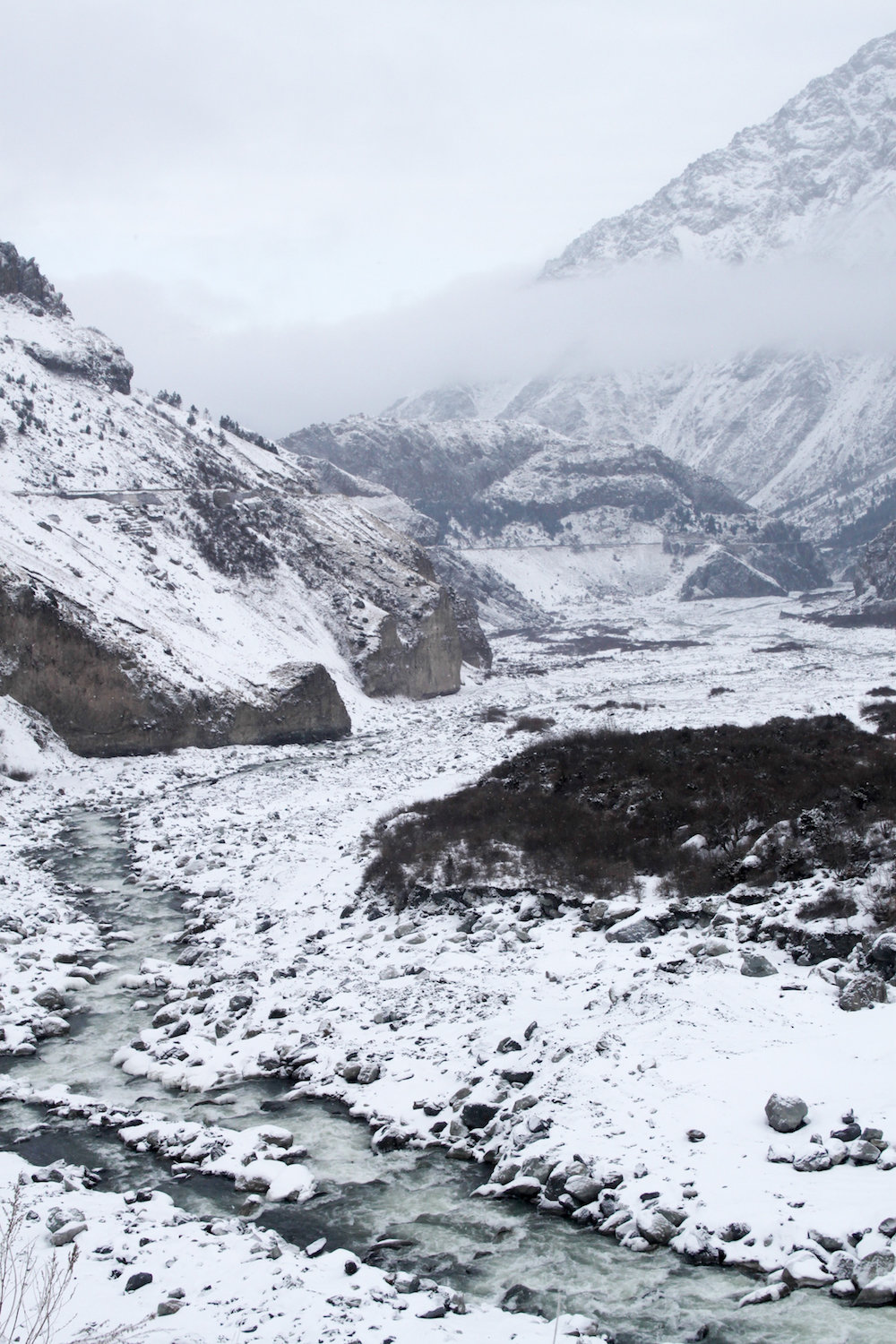
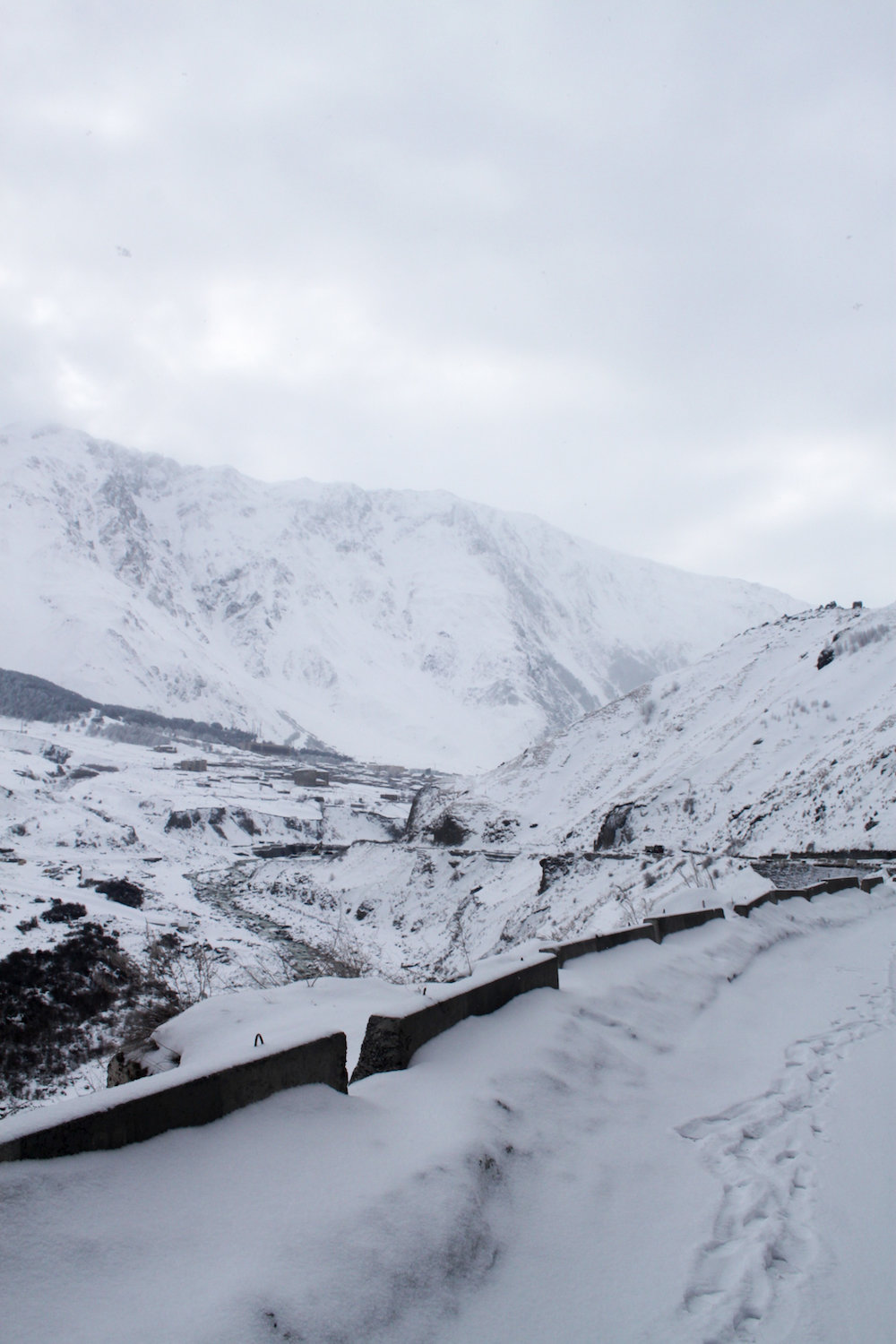

When we got to the square, the driver piled us into his van. We picked up more people, and soon we were on the road, feeling good about being back in Tbilisi soon. But just before the Jvari Pass, we were stopped by a line of cars and police. The road was closed. It was too dangerous to continue. Everyone grumbled, but no one seemed phased – apparently we were just going to wait it out. All around us, men were getting in and out of their cars, kissing each other on the cheek, complaining, it seemed, about the safety measures.
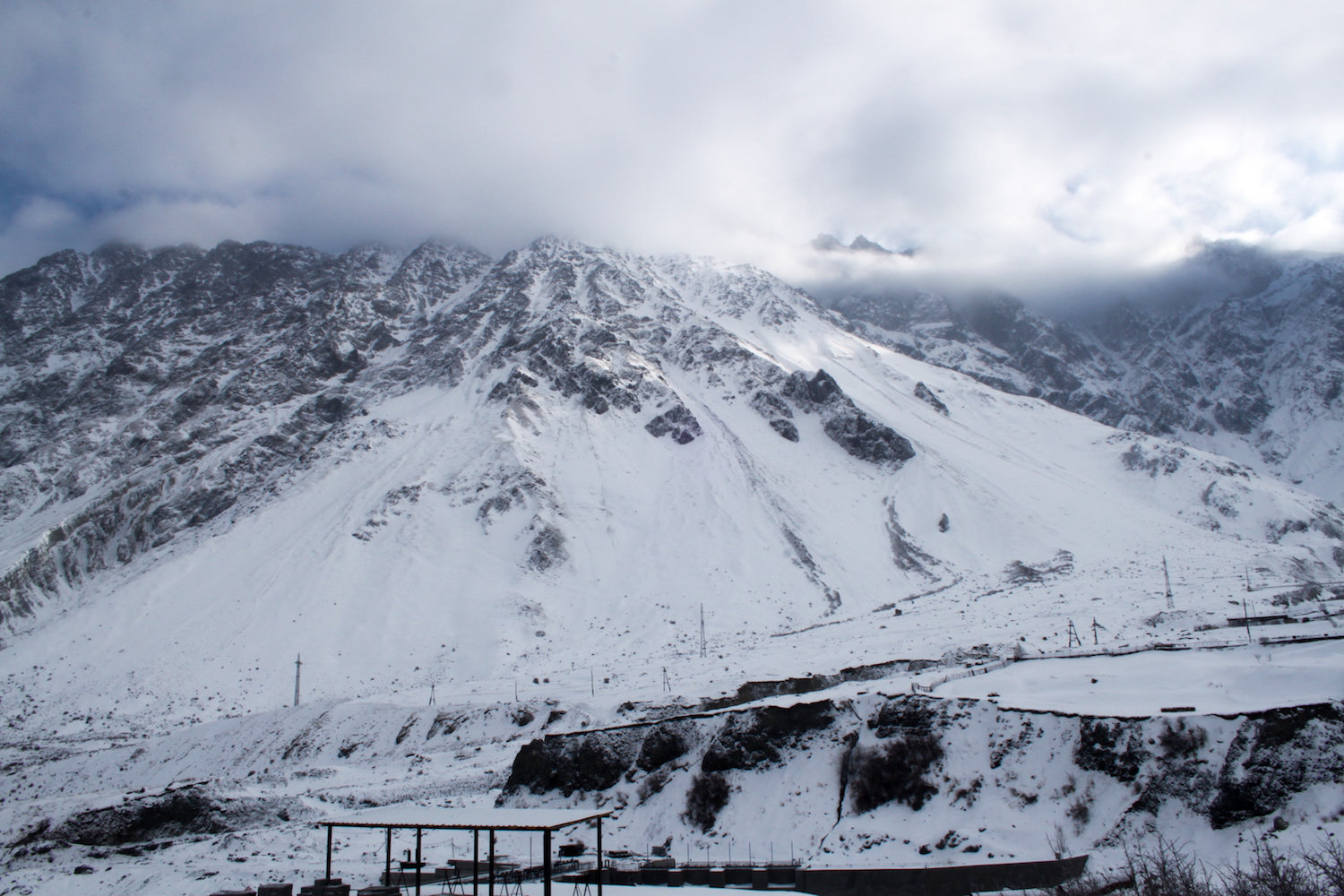
Suddenly, all the loitering drivers were running back, stubbing cigarettes. We’d been waiting an hour and had just been given the go-ahead. The line of cars lurched forward, and it soon became clear why the road had been deemed unpassable. Though nowhere near as treacherous as it had been the day before, the road was white, the air was white, everything white except for the dim brakelights of the car ahead of us. We crawled around the curves and through dark tunnels for fifty kilometers until we reached Gudauri, where the road curled down the mountain, sun once again sparkling over the snow. The descent into Tbilisi took just about three hours, the mountains smoothing into matchstick-covered humps, and places we’d thought improbably high on the way up seemed impossibly quaint on the way back down.
Did you ever say why you wanted to go to Stepantsminda? I don’t recall. It seemed that it was worth taking the dangerous trip: helpful people, good food, friendly dogs, and rugged cows. But what a tough place to live. Wasn’t Stalin a Georgian? I guess if you grow up in that inhospitable area, you grow up tough.
David wanted to see the mountains. If I had known what the trip would entail, I never would have gone. If we’d been able to turn around, I would have done it in a heartbeat. But since we went up the mountain and came back down in one piece, at least I’ve got a story to tell. And yes, Stalin was a Georgian! We visited his birthplace and saw his childhood home.
Glad you got down those mountain roads safely, Lyz! Yes to always tucking a spare pair of socks in your travel bag on your future adventures.
And again I say, never, never, never get into cars with strangers.